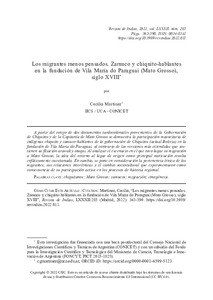Please use this identifier to cite or link to this item:
https://repositorio.uca.edu.ar/handle/123456789/16750| Título: | Los migrantes menos pensados. Zamuco y chiquito-hablantes en la fundación de Vila Maria do Paraguai (Mato Grosso), siglo XVIII Unexpected migrants. Zamucoan and Chiquitano in the foundation of Vila Maria do Paraguai (Mato Grosso), eighteenth century |
Autor: | Martínez, Cecilia Gabriela | Palabras clave: | ETNOGENESIS; PUEBLOS ORIGINARIOS; MIGRACION; Siglo XVIII | Fecha de publicación: | 2022 | Editorial: | Consejo Superior de Investigaciones Científicas | Cita: | Martínez, C. Los migrantes menos pensados. Zamuco y chiquito-hablantes en la fundación de Vila Maria do Paraguai (Mato Grosso), siglo XVIII [en línea]. Revista de Indias. 2022, 82(285) doi:10.3989/revindias.2022.011 Disponible en: https://repositorio.uca.edu.ar/handle/123456789/16750 | Resumen: | Resumen: A partir del cotejo de dos documentos tardocoloniales provenientes de la Gobernación de Chiquitos y de la Capitanía de Mato Grosso se demuestra la participación mayoritaria de indígenas chiquito y zamuco-hablantes de la gobernación de Chiquitos (actual Bolivia) en la fundación de Vila Maria do Paraguai, al contrario de las versiones más extendidas que sos-tienen su filiación arawak y otuqui. Al analizar el escenario en el que tuvo lugar su migración a Mato Grosso, la idea del retorno al lugar de origen como principal motivación resulta enfáticamente cuestionada. En cambio, se pone en consideración la pertenencia étnica de los migrantes, sus relaciones interétnicas y el cambio sociocultural que experimentaron como consecuencia de su participación activa en los procesos de historia regional. Abstract: The comparison of two late colonial documents from the Chiquitos Government and the Mato Grosso Captancy shows that Chiquito and Zamucoan-speaking indigenous people from Chiquitos (now Bolivia) played a leading part in the foundation of Vila Maria do Paraguai, contrary to the most widespread versions that argue their Arawak and Otuqui affiliation. Furthermore, the analysis of the context in which their migration to Mato Grosso took place emphatically relativizes the idea of return to their place of origin as the main motivation to flee Chiquitos. On the other hand, other variables are considered, in addition to their ethnic background, such as their interethnic relations, and the sociocultural change they experienced as a result of their active participation in decisive regional historic processes. |
URI: | https://repositorio.uca.edu.ar/handle/123456789/16750 | ISSN: | 0034-8341 | Disciplina: | HISTORIA | DOI: | 10.3989/revindias.2022.011 | Derechos: | Acceso abierto | Fuente: | Revista de Indias. 2022, 82(285) |
| Appears in Collections: | Artículos |
Files in This Item:
| File | Description | Size | Format | |
|---|---|---|---|---|
| migrantes-menos-pensados.pdf | 505,52 kB | Adobe PDF |  View/Open |
Page view(s)
33
checked on Apr 27, 2024
Download(s)
20
checked on Apr 27, 2024
Google ScholarTM
Check
Altmetric
Altmetric
This item is licensed under a Creative Commons License

